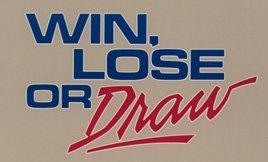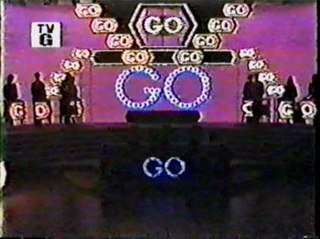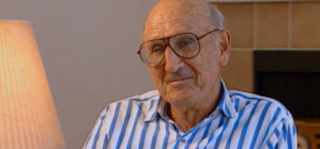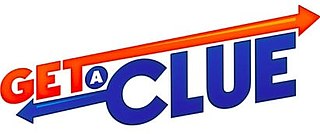
Match Game is an American television panel game show that premiered on NBC in 1962 and has been revived several times over the course of the last six decades. The game features contestants trying to match answers given by celebrity panelists to fill-in-the-blank questions. Beginning with the CBS run of the 1970s, the questions are often formed as humorous double entendres.

Password is an American television game show. Two teams, each composed of a celebrity and contestant, attempt to convey mystery words to each other using only single-word clues, in order to win cash prizes.

Win, Lose or Draw is an American television game show that aired from 1987 to 1990 in syndication and on NBC. It was taped at CBS Television City, often in Studios 31, 33, and 43 at various times. It was co-produced by Burt & Bert Productions and Kline & Friends for Disney's Buena Vista Television. It has also had two versions on The Disney Channel: Teen Win, Lose or Draw from 1989 to 1992, and a revived version known as Disney's Win, Lose or Draw which aired in 2014. New York described Win, Lose or Draw as "a knockoff" of the board game Pictionary, however, Burt Reynolds and Ed McMahon referred to playing the game at Burt's home during the August 2, 1978 episode of The Tonight Show, with Johnny Carson, three years before Pictionary was created.

Double Dare is an American television game show, produced by Mark Goodson & Bill Todman, that ran from 1976 to 1977 on CBS. The main game pitted two contestants in isolation booths attempting to correctly identify a person, place, or thing based on one-sentence clues. The bonus round then pitted the champion of the main game against a panel of three Ph.Ds, referred to as the "Spoilers". Alex Trebek was the host, with Johnny Olson and later Gene Wood announcing. The show was created by Jay Wolpert.

Tattletales is an American game show produced by Goodson-Todman Productions in association with Fremantle. The program had two runs on the CBS daytime schedule between February 1974 and June 1984. It was hosted by Bert Convy, with several announcers including Jack Clark, Gene Wood, Johnny Olson and John Harlan providing the voiceover at various times. Wood was the primary announcer during the show's first run, and Olson was announcing during the 1980s.

Now You See It is an American television game show created by Frank Wayne for Mark Goodson-Bill Todman Productions. The object of Now You See It is to answer general knowledge trivia questions by finding the answers hidden in a grid, similar to a word search puzzle.

Chain Reaction is an American television game show created by Bob Stewart, in which players compete to form chains composed of two-word phrases.

Go is an American television game show created by Bob Stewart and aired on NBC from October 3, 1983, to January 20, 1984. The show featured two teams, each composed of four contestants and a celebrity. The teams had to construct questions one word at a time to convey a word or phrase to their teammates. The concept of Go was based on "Instant Reaction", an endgame played on two different iterations of another game show created by Bob Stewart, Chain Reaction, in 1980 on NBC and from 2006–07 on GSN.

Body Language is an American game show produced by Mark Goodson Productions. The show aired on CBS from June 4, 1984, until January 3, 1986, and was hosted by Tom Kennedy. Johnny Olson announced until his death in October 1985; Gene Wood and Bob Hilton shared the announcing duties afterward, having substituted on occasion before then.

Child's Play is an American television game show in which adult contestants tried to guess words based on definitions given by children. The Mark Goodson-produced series debuted on CBS on September 20, 1982 and ended on September 16, 1983.

Bob Stewart was an American television game show producer. He was active in the TV industry from 1956 until his retirement in 1991.

Mindreaders is an American game show produced by Goodson-Todman Productions that aired on NBC from August 13, 1979, through January 11, 1980. Although NBC originally agreed to a 26-week run, the network canceled Mindreaders after 22 weeks. The host was Dick Martin and the announcer was Johnny Olson, with Jack Narz subbing. The program was taped at Studio 4 at NBC in Burbank, California.

You Don't Say! is an American television game show that had three separate runs on television. The first version aired on NBC daytime from April 1, 1963, to September 26, 1969, with revivals on ABC in 1975 and in syndication from 1978 to 1979. The last two incarnations were executive produced by Ralph Andrews and produced and directed by Bill Carruthers.

The Price Is Right is an American game show produced by Mark Goodson-Bill Todman Productions, wherein contestants placed successive bids on merchandise prizes with the goal of bidding closest to each prize's actual retail price without surpassing it. The show was a precursor to the current and best-known version of the program, which premiered in 1972 on CBS's daytime schedule. It makes The Price Is Right one of only a few game show franchises to have aired in some form across all three of the Big Three television networks.
PDQ and Baffle are American television game shows created by Heatter-Quigley Productions. Both shows' objective was for contestant/celebrity teams to guess a given word or phrase in the shortest amount of time with the fewest letters given as possible.
Get the Message is a television game show produced by Mark Goodson and Bill Todman which aired on ABC's daytime schedule for nine months in 1964.

Showoffs is an American television game show which ran on ABC from June 30 to December 26, 1975. Bobby Van was host, with Gene Wood as announcer. The Mark Goodson-Bill Todman production involved two teams competing in a game of charades.

Missing Links is a Goodson-Todman game show hosted by Ed McMahon which originally ran on NBC from September 9, 1963, to March 27, 1964, then moved to ABC for its final nine months, with Dick Clark replacing McMahon as host.

Password Plus and Super Password are American TV game shows that aired separately between 1979 and 1989. Both shows were revivals of Password, which originally ran from 1961 to 1975 in various incarnations. With only subtle differences between them, both Password Plus and Super Password retained the format of play as their predecessor, with two teams of two people each—a celebrity and a contestant—attempting to guess a mystery word using only one-word clues. A new feature included a series of five passwords as clues to an overarching puzzle for the teams to solve.

Get a Clue is an American television game show hosted by Rob Belushi that aired on Game Show Network from January 6, 2020 to April 16, 2021.

















